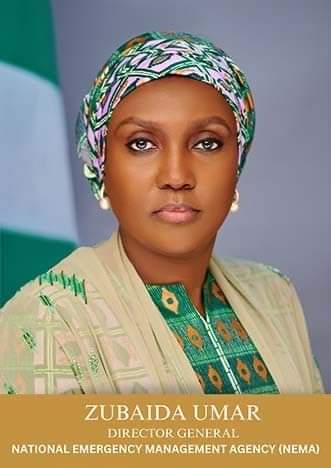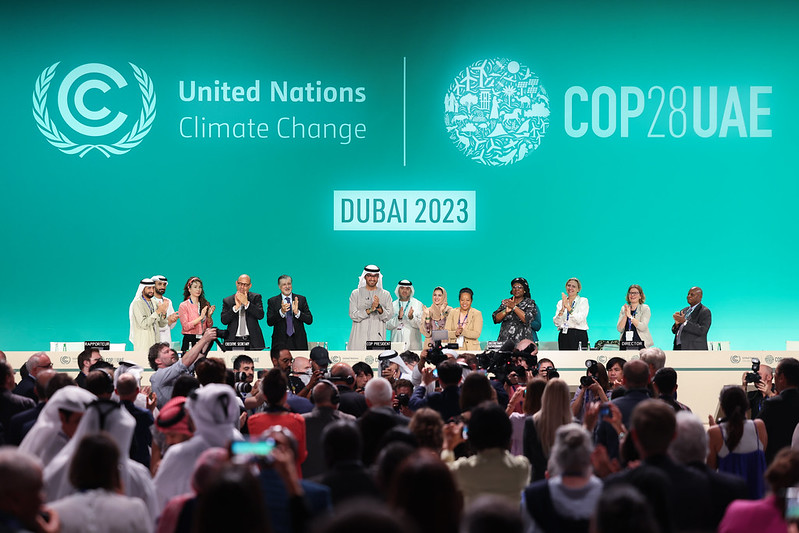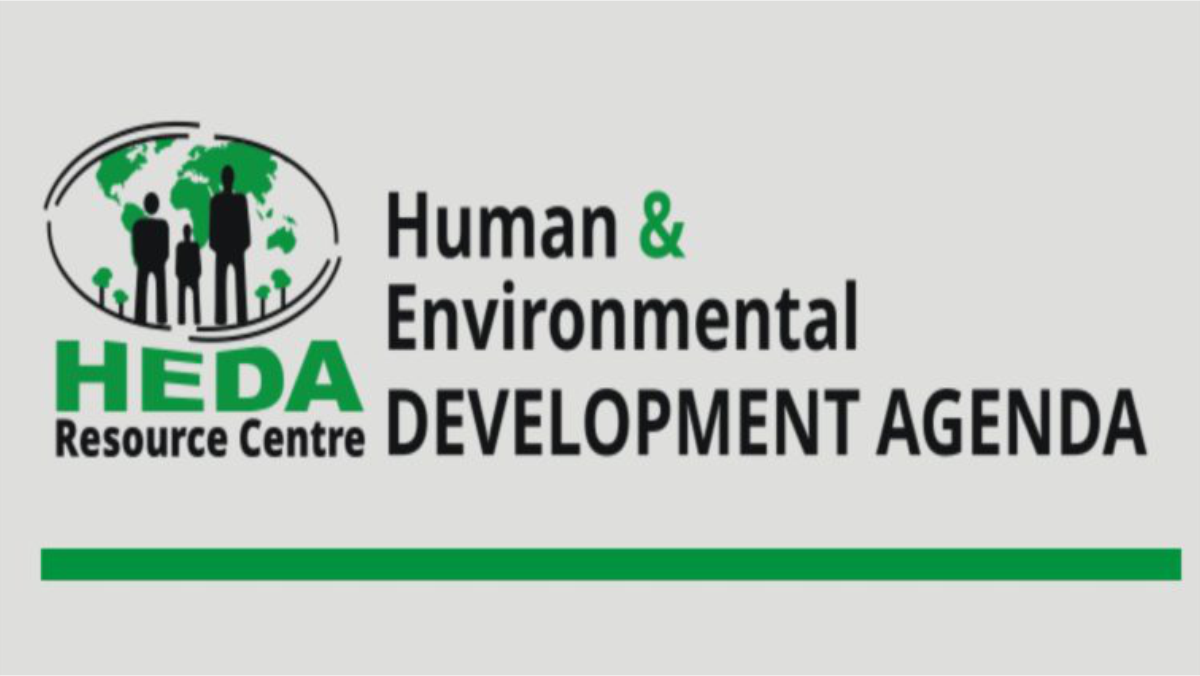Stakeholders Call for Swift Response to Address Climate Crisis in Vulnerable country’s

By Fatima Saka
Stakeholders have emphasised on climate-induced loss and damage and its disproportionately effects on the vulnerable countries, hereby urged the international community to respond swiftly with fair, and substantial financial support to address this crisis.
This follows the Communiqué issued at the end of the Second National Conference on Climate Change, 2023, held at the Reitz Continental Hotel, Abuja, Nigeria.
A diverse assembly of frontline communities, civil society, scholars, development experts and representatives of key government environmental agencies in Nigeria converged in FCT, Abuja on October 23, 2023. This critical gathering marked the second annual National Conference on Climate Change, organised by Corporate Accountability and Public Participation Africa (CAPPA), ahead of COP28.
The gathering tagged ‘‘Creating a sustainable climate finance for Nigeria’’ featured engaging panel sessions and insightful discussions that interrogated the Nigerian Agenda for Cop28, the hidden truth about carbon offsets, the plight of the sinking city of Ayetoro in Ondo State, the unending pollution siege on the Niger Delta, the disappearing Lake Chad, the African Climate Summit pact and other global climate conversations of national interest.
In his opening remarks, Dr. Iziaq Salako, Honourable Minister of State for Environment, Federal Ministry of Environment, Nigeria, represented by Mr. Jonah Barde, underscored the importance of recognizing climate change as not just an environmental concern but also an economic, social and moral imperative that demands coordinated and collective action.
The keynote address at the event entitled Loss and Damage Fund and the Quest for Sustainable Climate Finance Mechanism, delivered by Prof Lanre Fagbohun, Former Vice Chancellor, Lagos State University emphasised the urgent need for a sustainable climate finance mechanism for Nigeria and extension, Africa.
HRH Oba Ojagbohunmi Oluwambe (JP), the Ogeloyinbo of Ayetoro discussed the dire situation of Ayetoro City in Ondo State, a once beautiful coastal community now ravaged by climate change-induced ocean surges and destructive floods. The plight of Ayetoro is further exarcebated by the incessant fossil fuel exploration around its resource-rich area that has caused a degradation of its lands, waters and relief profile. The resulting damage has forced the indigenous population into makeshift homes, while government interventions have consistently fallen short, leaving the town and its vulnerable populations in ruins.
Furthermore, Dr. Nnimmo Bassey, Executive Director, Health of Mother Earth Foundation, interrogated the Nairobi Declaration at the Africa Climate Summit, highlighting the failure of African leaders at the meeting to reach a definite pro-people strategy for tackling the profound repercussions of climate change and reckless extractivism across the continent. He emphasised that Africa must adopt the social energy manifesto outlined by frontline communities and vulnerable populations in the Global South. The manifesto underscores the critical need for a just transition that halts the cannibalistic and colonialist exploitation of Africa’s invaluable mineral resources – a matter of paramount importance for the continent’s sustainable future.
After intense deliberations, participants at the conference made the following observations: “Nigeria, like many other nations, is grappling with the devastating impacts of climate change, including extreme weather events and ecological disruptions.
“There is an urgent need to address the challenges posed by climate change and its adverse impact on the Nigerian environment, economy and social fabric.
“Despite being the least contributor to global warming, African nations bear the brunt of its consequences, an unjust burden on the continent.
“While COP27 agreed on a loss and damage fund for vulnerable countries, the lack of commitment from historically polluting nations, such as the US, Europe, and even China to make reparations undermines its viability. Also, the absence of a pro-people strategy from African governments in demanding accountability from polluting nations and entities prolongs the much-needed assistance for climate change victims.
“The failure of countries and the Transitional Committee for the operationalisation of the Loss and Damage finance mechanism to reach an agreement on where the funds will be warehoused and the paying entities is a significant setback for the upcoming COP28.
“Constrained budgets of African nations tethered to unending debt repayments and servicing limit their abilities to invest in economic, social protection, and climate mitigation and adaptation efforts.
“The Africa Climate Summit failed to make a commitment to phase out fossil fuel use. Even though the continent’s argument is anchored in the belief that Africa must utilise its resources for development, the extraction of Africa’s resources is rarely used for the development of its population but exported abroad.
“Recent US and EU proposals, discussed at the UN Transitional Committee Meeting in Aswan, Egypt, suggesting the World Bank as a potential host for the loss and damage fund, are ill-conceived. This move would compound the already formidable debt challenges faced by vulnerable developing nations, particularly in Africa. As rightly pointed out by Pedroso Cuesta, the Cuban Chair of the G77 plus China, the World Bank’s focus on loans and lack of climate-oriented ethos does not align with the specific needs of African societies. Consequently, entrusting the World Bank and other related international financiers with climate decisions for vulnerable nations could put these communities at even greater risk.
Despite the billion-dollar pledges the Africa Climate Summit attracted from developed nations, it failed to meet the expectations of marginalised communities due to its fixation on false solutions such as carbon markets and the auctioning of Africa’s hinterlands as a means to realising its climate aspirations.
“The proposal of carbon markets and the commodification of Africa’s forests and bio-resources as solutions to Africa’s climate finance challenges is counterproductive. It will only fuel a wave of eco-colonization. Vulnerable communities across Africa are already experiencing grim consequences, with ongoing brutal displacements of local communities from their ancestral homes as capitalists invade and acquire the latest prime sites in places such as Cross River in Nigeria, Kenya, and Liberia among others.
“There are indications that corruption has played a major role in the inability of African governments to deliver the much-needed traction in the battle to contain negative climatic conditions on the continent.
“The Conference of Parties meetings under the auspices of the United Nations Framework on Climate Change (UNFCCC) has failed to hold polluting nations and corporations accountable for their historic and ongoing climate atrocities.
“The Nigerian government’s inaction in the face of the agelong environmental degradation of the Niger Delta is indefensible, leaving vulnerable communities to wither in the stranglehold of poverty, economic ruin, and social despair.
“The tragic fate of Ayetoro City, the sinking city, in Ondo State, once a pioneering beacon of communism in Africa is very sad and regrettable. What should have been a vibrant tourist haven has been reduced to a sinking wasteland and a mournful shadow of the city’s former glory.
However, the Conference agreed on the following recommendations: “Nigeria must adopt a just, equitable and inclusive climate change agenda that will convey the interests of all, particularly the highly impacted frontline communities.
“Nigeria must lead the way among African nations in advancing the call for historical liability.
“Culpable national entities must payup, contribute to loss and damage funds, commit strongly to cutting emissions and make reparations for the consequences of their actions.
“African governments must show accountability and transparency in managing climate funds directed to vulnerable communities.
“African countries must play an active role in reaching international agreements on the warehousing and disbursements of loss and damage funds. The continent must also ensure transparency, efficiency, and equitable distribution of funds.
“Nigeria and other African nations in extension, must collectively reject ill-conceived proposals such as the warehousing of the loss and damage fund at the World Bank. Options for warehousing the fund can include situating the fund within existing mechanisms of the UNFCCC and further strengthening such mechanisms to be fit for purpose. The Fund can also be situated in relevant regional institutions of vulnerable states to ensure easier access for frontline communities.
“Global climate governance cannot continue to be used to promote the interests and businesses of the Global North and its corporations.
“Funds mobilised from the private sector to address climate challenges must not create additional debt burdens for countries or individual recipients in Africa.
“The Transitional Committee established to operationalize the funding arrangements for the Loss and Damage Fund must develop clear evaluation and monitoring parameters for identifying relevant losses and ensuring that resources get directly to affected communities. This is to prevent the misuse of such funds by corrupt officials.
“African peoples and leaders must stand against the commodification of their forests and bio-resources through carbon markets. African governments must promote policies that reject the notion that Africa could become a storehouse for global emissions, prioritise the well-being of local communities, and protect their culture and ancestral lands.
“Stakeholders should launch a national day for climate action.
“Nigeria’s climate governance must consistently engage vulnerable frontline communities in climate discussions and ensure that their voices are captured in climate policy formulation and implementation.
“Academia must work together with civil society to bolster climate action.
“To preach the gospel of climate change and actions in targeted spaces such as universities, and churches among others.
“As the world races towards a renewable era, Africa must leverage its potential to lead the charge by leapfrogging fossil fuel dependence and ploughing substantial investments into its endowed renewable energy sector to eradicate energy poverty among its population and drive transformative development.
“State authorities must launch an investigation into the monies and contracts awarded for rehabilitating Ayetoro City which remains unaddressed.
“For short-term action, the Federal government in concerted efforts with the Ondo State government can build physical barriers like seawalls and breakwaters that can help slow sea surges and the rising sea challenges affecting the community.
“Climate campaigners must unpack and localise climate language to drive and contextualise climate action, including facilitating effective discussion of ideas within communities.
“A just transition must empower communities with capacities, skills and technological know-how to build resilience against the devastating impacts of climate change.
“State authorities must uphold the rights of environmental defenders.
“Nigeria and Africa must strive to generate their own local climate data and uphold community experiences and solutions in defining responses to climate change and utilizing climate funds for impacted communities. State authorities must also insist that foreign investments and intervention support engage in consultative processes with communities, mirroring their indigenous knowledge and contextual needs.
“State authorities must increase budgetary allocation and support to victims of environmental and climate disasters.
“The Nigerian agenda for COP28 must be centred around its people, adopt indigenous knowledge and improve its engagement with local communities. It must also independently define what constitutes its Loss and Damage realities (such as the impact of climate change on the health, livelihoods and psychology of its people) as a negotiating tool in regional and global climate conversations.
“Nigeria’s climate governance must also mainstream the needs and lived experiences of vulnerable groups such as women, children, and people living with disabilities, to foster inclusivity in responses.
“The Nigerian state must hold polluting entities such as Shell to pay up its counterpart funding for the cleanup of the Ogoni land and release monies to the Hydrocarbon Pollution Remediation Project (HYPREP) for the remediation of impacted sites in the Niger Delta.
“Citizens must develop a culture of participating and engaging state authorities and governance processes.
“The Nigerian government must stop the ongoing divestments by International Oil Companies (IOCs) from onshore oil operations in the Niger Delta, and compel them to own up, pay up and clean up their pollution as well as address human rights abuses in the region.
“The Nigerian state must devote attention and resources to rehabilitating communities like Ayetoro City, the sinking city in Ondo State among other vulnerable areas and frontline communities across the country affected by the impacts of climate change and environmental degradation. To be clear, cities like Ayetoro are hazards to their inhabitants and greatly inimical to the well-being of the people. They must be declared a national emergency and efforts and funds mobilised to immediately respond to the crisis.
“Not all climatic conditions can be dictated to the country and peoples with foreign-based solutions. The Nigerian state must dig deep within to come up with innovative solutions that address the unique context of its climate challenges.
“State authorities must channel investment interventions to recharge Lake Chad and also mitigate desert encroachment in Northern Nigeria.
“Develop a concept note detailing Ayetoro’s plight, and submit it to the National Council of Climate Change or other relevant federal agencies to initiate a support process.
“Finally, arising from conversations, the conference resolves to formally engage with the government at various levels to communicate the deplorable conditions of vulnerable communities such as Ayetoro City and the necessity of ensuring governmental action to address the debilitating conditions of these communities.





